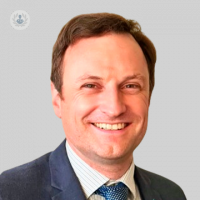What does the initial management of an ACL injury entail?
Written in association with:Anterior cruciate ligament (ACL) reconstruction is a surgical procedure commonly performed to restore knee stability after an ACL tear, a prevalent injury among athletes. The ACL, one of the four major ligaments in the knee, plays a crucial role in maintaining knee stability by preventing the tibia from sliding out in front of the femur. ACL injuries are frequent in sports involving sudden stops, pivots, and changes in direction, such as soccer, basketball, and football.
Here to walk us through ACL reconstruction after sports injuries and general ACL damage is esteemed consultant orthopaedic hip and knee surgeon, Mr J Donald Hansom.

Diagnosis and initial management
An ACL injury typically manifests as a "popping" sensation, followed by pain, swelling, and instability of the knee. Diagnosis is confirmed through physical examination and imaging techniques, such as MRI. Initial management often involves rest, ice, compression, and elevation (RICE), along with physical therapy to reduce swelling and restore range of motion.
The decision for surgery
Whether to undergo ACL reconstruction depends on various factors, including the patient’s activity level, degree of instability, and overall health. For athletes and active individuals, surgery is often recommended to return to pre-injury levels of activity and prevent further knee damage.
The surgical procedure
ACL reconstruction involves replacing the torn ligament with a graft, usually sourced from the patient’s patellar tendon, hamstring tendon, or a donor. The surgery is typically performed arthroscopically, using small incisions and a camera to guide the procedure. This minimally invasive approach reduces recovery time and scarring.
Post-surgical rehabilitation
Rehabilitation is crucial for successful recovery. It starts with controlling pain and swelling, followed by exercises to restore knee range of motion and strength. Physical therapy progresses in phases, gradually reintroducing weight-bearing activities and functional exercises tailored to the patient's sport-specific needs. Full recovery and return to sports usually take about six to 12 months, depending on the individual’s progress and adherence to the rehabilitation protocol.
Long-term outcomes
ACL reconstruction has high success rates, with most patients regaining knee stability and returning to their previous levels of activity. However, there are risks, including graft failure, stiffness, and potential long-term osteoarthritis. Adhering to post-operative care and rehabilitation significantly enhances outcomes, allowing athletes to safely return to their sport.


